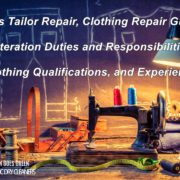How to Find the Best Tailor: A Combination of Art and Technology
Finding a good tailor is a personal experience. Finding a tailor who is great at his craft and cares about your clothes and style creates a special relationship, similar to finding a barber you trust. Best tailoring is more than just a skill, it is an art form. Clothes that fit your body well increase your confidence, and a skilled tailor can make the clothes look like they were tailored to you.
What makes the best tailors different?
Attentive Listening: Listen carefully to your needs and provide professional advice where warranted.
Understand personal style: Consider your style and handle clothing appropriately.
Pro advice: Many people don’t know what changes are possible when their favorite clothes don’t fit. A tailor’s expertise solves these problems.
Find the best tailor in New York
There are a variety of tailors on Long Island. We worked hard to find the best tailor. It reflects the opinions of industry insiders, including stylists, editors, and trendsetters. There are a lot of choices, but this may be helpful as a starting point.
From a simple old-fashioned tailor shop
decorated showroom,
Even a showroom offering door-to-door service.
What services can I receive?
Custom Tuxedo Perfect for Your Wedding
Adjusting the hem of vintage jeans
wool coat sizing
Jacket lining adjustment
Find a store that can do all this and more. A good tailor will breathe new life into your wardrobe and make you look even better.
https://www.facebook.com/Joestailors/
Twitter
https://twitter.com/CleanersJoe
Instagram
https://www.instagram.com/dry.cleans/
LinkedIn
https://www.linkedin.com/in/drycleaner/
Pinterest
https://www.pinterest.com/WestburyCleaners/
Yelp
https://www.yelp.com/biz/joes-organic-cleaners-westbury
YouTube
https://www.youtube.com/@dry-cleaners
Facebook
https://www.facebook.com/Joestailors/
https://www.facebook.com/westburycleaners/
https://www.facebook.com/Joescleaner/
Blogspot
https://joescleaner.blogspot.com/




